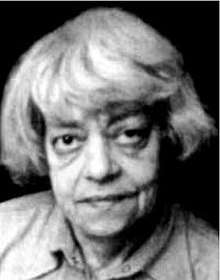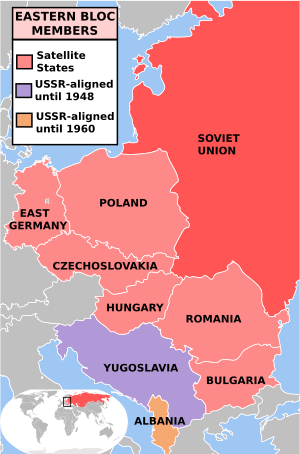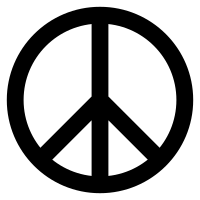1968 Red Square demonstration
The 1968 Red Square demonstration (Russian: Демонстра́ция 25 а́вгуста 1968 го́да) took place on 25 August 1968 at Red Square, Moscow, Soviet Union, to protest the invasion of Czechoslovakia by the Soviet Union and its Warsaw Pact allies, that occurred during the night of 20–21 August 1968, crushing the Prague Spring, a set of de-centralization reforms promoted by Alexander Dubček.
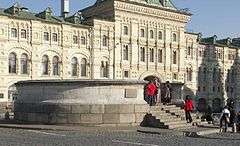 | |
| Date | August 25, 1968 |
|---|---|
| Time | Noon |
| Location | Lobnoye Mesto, Red Square, Moscow |
| Cause | Warsaw Pact invasion of Czechoslovakia |
| Participants | Larisa Bogoraz, Konstantin Babitsky, Vadim Delaunay, Vladimir Dremliuga, Pavel Litvinov, Natalya Gorbanevskaya, Viktor Fainberg, Tatiana Baeva |
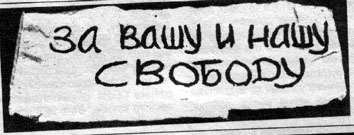
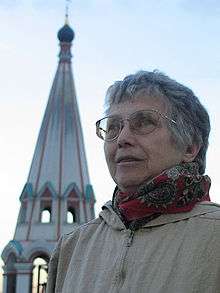
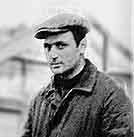
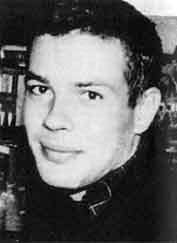
Many people over the world had protested against the suppression of the Prague spring with troops of Soviet Union and other countries of the Warsaw Pact. One such act of protest took place in Moscow, at the Red Square. The protest was held at the Lobnoye Mesto, to avoid any violation of public order that could have occurred during the demonstration. The protesters were sitting to avoid any inconvenience to ordinary citizens which might be caused by them standing, although this appears to have had little effect.
The protest
The protest began at noon as eight protesters (Larisa Bogoraz, Konstantin Babitsky, Vadim Delaunay, Vladimir Dremliuga, Pavel Litvinov, Natalya Gorbanevskaya, Viktor Fainberg, and Tatiana Baeva) sat at the Lobnoye Mesto and held a small Czechoslovak flag and banners with various slogans, including:
- "We are losing our best friends" («мы теряем лучших друзей»),
- "Ať žije svobodné a nezávislé Československo!" (Long live free and independent Czechoslovakia),
- "Shame to the occupiers" («Позор оккупантам!»),
- "Hands off the ČSSR" («Руки прочь от ЧССР!»),
- "For your freedom and ours" («За вашу и нашу свободу!»),
- "Freedom for Dubček" («Свободу Дубчеку!»).
Within a few minutes, seven protesters were assaulted, brutally beaten and loaded into cars by KGB operatives. The Czechoslovak flag was broken, and the banners were confiscated. Since Natalya Gorbanevskaya had recently given birth, she was not made to stand trial. The other protesters convinced 21-year-old Tatiana Baeva to declare that she had been at the scene by accident, and she was released soon after.
The KGB failed to find out which protester was holding which banner; therefore, all the banners were attributed to each protester, except for Tatiana Baeva, who was released. The banners were branded by the KGB as "anti-Soviet".[1][2]
Trial
During the investigation and trial, the defence revealed several inconsistencies in the accusations. One of the eyewitnesses declared that he saw protesters leaving the GUM, a large store in the vicinity, even though this store is closed on Sundays. Additionally, all eyewitnesses happened to be from the same military division, even though they all claimed that they ended up on Red Square accidentally. However, these inconsistencies were not taken into account during the trial.
None of the demonstrators pleaded guilty. Vadim Delaunay and Vladimir Dremlyuga were sentenced to three years. Victor Fainberg had his teeth knocked out during the arrest; instead of appearing in court, he was sent to a psychiatric prison. Larisa Bogoraz was sentenced to four years of exile to a remote Siberian settlement in the Irkutsk region. Konstantin Babitsky was sentenced to three years of exile. Pavel Litvinov was sentenced to five years of exile. Natalya Gorbanevskaya was released the same day but was later sent to a psychiatric prison.
Reaction to the trial and recognition of protesters
Lawyers for the defence, all members of the Communist Party of the Soviet Union who were appointed and paid for by the state, had shown that there was no criminal intent in the demonstration held by the protesters,[3] but despite this, the protesters received harsh sentences of up to several years in prison.
It was claimed by Yuliy Kim that the sentences had already been written down before the trial.[4] Yuliy Kim wrote the song "Ilyich", which mentions Yuri Andropov's and Leonid Brezhnev's anger regarding the demonstration, and names three of the participants: Pavel Litvinov, Natalya Gorbanevskaya and Larisa Bogoraz.[5]
Public recognition of the protesters had to wait 40 years. During the conflict in South Ossetia, August 2008, the former president of the Czech Republic, Václav Havel, expressed his sympathies for the protesters of 1968.[6] Czech Premier Mirek Topolánek recognized the heroism of the protesters with awards.[7] Yet, no similar recognition is reported from the side of the Russian government. Instead, 24 August 2008, the similar demonstration with the slogan For your freedom and ours happened at the same place.[8]
On 25 August 2013, the 45th anniversary of the demonstration, Gorbanevskaya and several of her friends recreated the original protest,[9] again featuring the "For your freedom and ours" banner. Ten participants (among them Delaunay's son Sergey) were arrested almost immediately and taken to a police station. They were soon arraigned and released pending court appearance on charges of failing to secure prior permission for a political rally,[10] a misdemeanor under current Russian law. In 2018 three participants were arrested.[11]
The 1968 demonstration is recounted in the 2005 documentary They Chose Freedom.
References
- Letter by Yuri Andropov to Central Committee about the demonstration, 5 sept. 1968, in the Vladimir Bukovsky's archive, (PDF, faximile, in Russian), http://psi.ece.jhu.edu/~kaplan/IRUSS/BUK/GBARC/pdfs/dis60/kgb68-5.pdf Archived 8 November 2017 at the Wayback Machine
- Andropov to the Central Committee. The Demonstration in Red Square Against the Warsaw Pact Invasion of Czechoslovakia. 20 September 1968, at Andrei Sakharov's archive, in Russian and translation into English, "Archived copy". Archived from the original on 12 October 2007. Retrieved 17 June 2007.CS1 maint: archived copy as title (link)
- Talk by advocate S.V.Kallistratova in defense of V.Delaunay (Речь адвоката С.В.Калистратовой в защиту В.Делоне), in Russian. http://www.memo.ru/library/books/sw/chapt49.htm
- Yuly Kim. Advocat's vals. (Адвокатский вальс), in Russian http://www.memo.ru/library/books/sw/chapt18.htm
- Yuily Kim, "Ya sam sebe Iliich" (in Russian), http://www.bards.ru/archives/part.php?id=6188
- Ярошевский, Виталий (21 August 2008). "На Лобном месте" [On the Lobnoe mesto]. Novaya Gazeta (in Russian) (61). Archived from the original on 4 September 2008.
- Premier Awarded Commemorative Medals to Ten Dissidents from 1968. Press Release of the government of the Czech Republic, 21 August 2008, http://www.vlada.cz/scripts/detail.php?id=40255
- Sophia Kishkovsky (25 August 2008). "Red Square protest echoes 1968". Gerald Tribune. Archived from the original on 13 September 2008. Retrieved 31 August 2008.
- Photograph from 2013 recreation of the protest, from Gorbanevskaya's Livejournal blog, http://ng68.livejournal.com/2062987.html%5B%5D
- "Police release all Red Square detainees", in Russian, "Lenta" news stream, 25 August 2013 http://lenta.ru/news/2013/08/25/redsquare/
- Three people were arrested on red square for remembrance of the 1968 Red Square demonstration, Novaya Gazeta, 25 August 2018
Bibliography
- Gorbanevskaya, Natalya (1972). Red Square at Noon. New York: Holt, Rinehart and Winston. ISBN 978-0-03-085990-8.
- Alexeyeva, Lyudmila (1987). Soviet Dissent: Contemporary Movements for National, Religious, and Human Rights. Carol Pearce, John Glad (trans.). Middletown, Conn.: Wesleyan University Press. ISBN 0-8195-6176-2.
- Boobbyer, Philip (2005). Conscience, dissent and reform in Soviet Russia. Routledge. ISBN 0415331862.
External links
- "Natalia Gorbanevskaya: Red Square at Noon. What I remember of the demonstration". Prague Writers' Festival. 28 May 2008.
- Soviet Archives posted by V. Bukovsky. Chapter 3.1 Dissidents, 1960–1969, https://web.archive.org/web/20180720130713/http://psi.ece.jhu.edu/~kaplan/IRUSS/BUK/GBARC/pdfs/dis60/dis60-e.html
- Boobbyer, Philip (2005). Conscience, dissent and reform in Soviet Russia. Routledge. ISBN 0415331862.
- Информация о демонстрации в бюллетене «Хроника текущих событий»
- Информация о суде над демонстрантами в бюллетене «Хроника текущих событий»
- Л. А. Кацва. История России. Cоветский период. (1917–1991)
- Сева Новгородцев 23 августа 2003: К 35-летию советского вторжения в Чехословакию.
